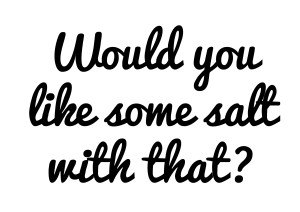Salt makes things taste better.
There is a rule of thumb in kitchens – three times more than you think you need.
Or, as much salt as you can use without it seeming salty.
Apparently it has something to do with the cooking process. Long-chain carbohydrates bind in sodium ions during cooking. From memory, it’s something to do with oxidisation. Natural salts are neutralised. Which means salt needs replacing.
So, chefs chuck it on just about everything.
Even ice cream.
Yum.
Salt takes away the bland.
It makes the taste noticeable. And therefore memorable.
It’s almost illegal how good salt is at adding flavor.
No wonder there are strong rumours that salt is about to go follow sugar out of restaurants in the US via the government-sponsored Door of Forced Healthiness.
We need to reclaim our right to salt.
Before we lose it in restaurants.
And before we lose it in the language we use.
I’m not suggesting you add a wee sweary in your corporate communications.
Not that kind of salty language.
(“Salty language” is “Sailor’s language”. “Salts” as in sailors. The sort of language a sailor would use. And, because sailors swore more than anyone, salty language came to mean swearing.)
But swearing is a heuristic. It’s a simple shortcut to a bigger idea. Swearing is a way of adding emphasis.
It adds flavor to our language. And the language needs flavour.
Apparently it comes down to shame.
In Holy Sh*t: A Brief History of Swearing, Melissa Mohr notes, in the 1600’s, people in London were much more comfortable using what are now considered swear words. And she puts it down to the fact people in the 1600s had less privacy. So, words like shit, piss, cock and arse were simple descriptors of body parts and bodily functions. The bodily functions everyone was overly familiar with. There was less shame. You couldn’t hide what you were doing. It was natural.
In the 1700’s, an increase in privacy meant an increase in shame. So toilet words gained the power to shock.
In seemingly unrelated news, 1760 saw the birth of the Industrial Revolution. This lead, inexorably, to the Age of Invention and then to the sexual revolution and the emergence of the Cult of Individualism (The “I’m Special and You’re Not” phenomenon.)
In judging people for who they are, we have made it shameful for judging people by what they are. So we now see statements of gender or race or religion or age or colour or any other identifier as having the power to shock.
And there are plenty of people out there just waiting to be outraged. To howl down the person who dares to dis-empower the individual.
Which has resulted in a blanding of the language.
Not just in terms of personal attributes, but through the fear of saying something which may offend through subtext.
Marketers, especially, are loathe to use any language which may negatively impact their brand.
But, rather than spend the effort in creating a unique voice which acknowledges these new parameters but still has enough character to be memorable, many marketers seem to take the easy route.
And produce words no one remembers.
Advertising (in whatever form) is one of the key shapers of language.
It has the power to change society.
But to do that, it first needs to be noticed.
Then remembered.
And that means doing a little more than simply telling people what they could read on the pack.
We need to be brave enough to ignore the fears. We need to be aware of them, but not let the fear get in the way of our need to be noticed.
We should worry more about what we can say than what we can’t.
No one ever got famous by not being noticed.
Here endeth the lecture.
Sorry if it sounded a bit high horsey-y.
For anyone wanting an hilarious reminder of the awesome power of words, I refer to Tim Minchin’s delightful song with two G’s, an N, an I, an E and an R.


Leave A Comment